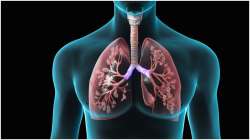How corona-recovered patients can improve lung function
Those corona-patients whose lungs were affected, post recovery, they may face problem in doing earlier routine or simple cardio exercises like running, jogging or brisk walking.

Since all the focus is on finding and treating people who are corona-positive, what about those who have recovered from the deadly COVID-19 disease and are trying to get their life back to normal? Are they going to face reduced lung capacity for the rest of their lives?
Over 2.5 lakh people have recovered so far across age-groups globally. In India, 267 people had recovered (as of Sunday) while the country reported over 3,374 cases.
According to Dr Vikas Maurya, HOD, Pulmonology and Senior Consultant (Sleep Medicine and Chest), Fortis Hospital Shalimar Bagh, patients who are symptomatic can have reduced lung capacity after recovering.
"As it's a novel virus, we don't know how long it will stay... but with experience with other respiratory viruses like H1N1, it may be there for few weeks to few months or few years depending on the degree of lung involvement and whether patient required ventilator or not," Maurya told IANS.
Those corona-patients whose lungs were affected, post recovery, they may face problem in doing earlier routine or simple cardio exercises like running, jogging or brisk walking.
"Gradually, once lungs become better, their capacity start increasing. They may also respond to few medications which have been tried and given in other respiratory viruses post recovery," Maurya explained.
According to Dr Puneet Khanna, Head of Pulmonology and Respiratory Medicine, Manipal Hospital, New Delhi, limited studies from China, Japan and South Korea have shown no major long term damage in the lungs of recovered COVID-19 patients.
"In around 20 per cent of those with severe pneumonia, some short term damage in terms of mild fibrosis may be seen," said Khanna.
Majority of patients can have normal functions and recover completely.
Those with fibrosis may have some reduced lung capacity in the long term, Khanna added.
Recovered patients should do breathing exercise and eat well to keep their immune system strong.
"They should take their medication prescribed for chronic diseases regularly. There are few cases of re-infection so they should strictly adhere to hand hygiene and social distancing," Khanna told IANS.
The lung capacity entirely depends upon the stages from where a corona-infected patient has recovered or how much damage it has created to the lungs.
"But if a patient had a severe breathing problem and had to be on a ventilator, then there are chances of reduced lung capacity. His routine activities like walking or running will also depend on that accordingly," said Dr Gyandeep Mangal, Senior Consultant, Respiratory Medicine, Sri Balaji Action Medical Institute, New Delhi.
The corona-recovered patients should avoid exertions initially.
"Gradually, as time progresses, try to increase exercise ability. Yoga can also be helpful in improving respiratory capacity along with breathing exercises," said Maurya.